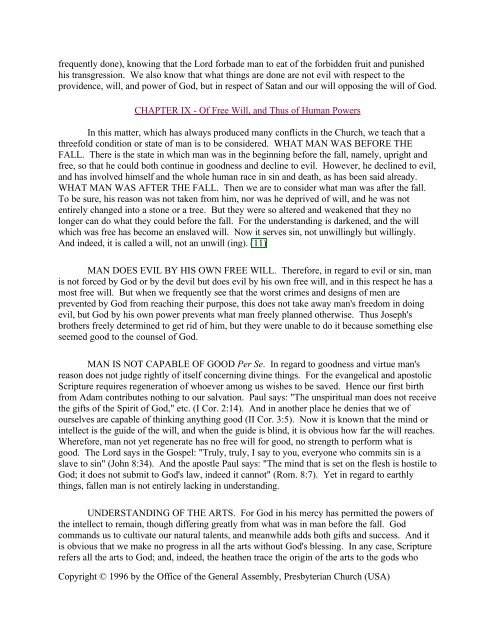The Book of Confessions - The Presbyterian Leader
The Book of Confessions - The Presbyterian Leader
The Book of Confessions - The Presbyterian Leader
Create successful ePaper yourself
Turn your PDF publications into a flip-book with our unique Google optimized e-Paper software.
frequently done), knowing that the Lord forbade man to eat <strong>of</strong> the forbidden fruit and punished<br />
his transgression. We also know that what things are done are not evil with respect to the<br />
providence, will, and power <strong>of</strong> God, but in respect <strong>of</strong> Satan and our will opposing the will <strong>of</strong> God.<br />
CHAPTER IX - Of Free Will, and Thus <strong>of</strong> Human Powers<br />
In this matter, which has always produced many conflicts in the Church, we teach that a<br />
threefold condition or state <strong>of</strong> man is to be considered. WHAT MAN WAS BEFORE THE<br />
FALL. <strong>The</strong>re is the state in which man was in the beginning before the fall, namely, upright and<br />
free, so that he could both continue in goodness and decline to evil. However, he declined to evil,<br />
and has involved himself and the whole human race in sin and death, as has been said already.<br />
WHAT MAN WAS AFTER THE FALL. <strong>The</strong>n we are to consider what man was after the fall.<br />
To be sure, his reason was not taken from him, nor was he deprived <strong>of</strong> will, and he was not<br />
entirely changed into a stone or a tree. But they were so altered and weakened that they no<br />
longer can do what they could before the fall. For the understanding is darkened, and the will<br />
which was free has become an enslaved will. Now it serves sin, not unwillingly but willingly.<br />
And indeed, it is called a will, not an unwill (ing). (11)<br />
MAN DOES EVIL BY HIS OWN FREE WILL. <strong>The</strong>refore, in regard to evil or sin, man<br />
is not forced by God or by the devil but does evil by his own free will, and in this respect he has a<br />
most free will. But when we frequently see that the worst crimes and designs <strong>of</strong> men are<br />
prevented by God from reaching their purpose, this does not take away man's freedom in doing<br />
evil, but God by his own power prevents what man freely planned otherwise. Thus Joseph's<br />
brothers freely determined to get rid <strong>of</strong> him, but they were unable to do it because something else<br />
seemed good to the counsel <strong>of</strong> God.<br />
MAN IS NOT CAPABLE OF GOOD Per Se. In regard to goodness and virtue man's<br />
reason does not judge rightly <strong>of</strong> itself concerning divine things. For the evangelical and apostolic<br />
Scripture requires regeneration <strong>of</strong> whoever among us wishes to be saved. Hence our first birth<br />
from Adam contributes nothing to our salvation. Paul says: "<strong>The</strong> unspiritual man does not receive<br />
the gifts <strong>of</strong> the Spirit <strong>of</strong> God," etc. (I Cor. 2:14). And in another place he denies that we <strong>of</strong><br />
ourselves are capable <strong>of</strong> thinking anything good (II Cor. 3:5). Now it is known that the mind or<br />
intellect is the guide <strong>of</strong> the will, and when the guide is blind, it is obvious how far the will reaches.<br />
Wherefore, man not yet regenerate has no free will for good, no strength to perform what is<br />
good. <strong>The</strong> Lord says in the Gospel: "Truly, truly, I say to you, everyone who commits sin is a<br />
slave to sin" (John 8:34). And the apostle Paul says: "<strong>The</strong> mind that is set on the flesh is hostile to<br />
God; it does not submit to God's law, indeed it cannot" (Rom. 8:7). Yet in regard to earthly<br />
things, fallen man is not entirely lacking in understanding.<br />
UNDERSTANDING OF THE ARTS. For God in his mercy has permitted the powers <strong>of</strong><br />
the intellect to remain, though differing greatly from what was in man before the fall. God<br />
commands us to cultivate our natural talents, and meanwhile adds both gifts and success. And it<br />
is obvious that we make no progress in all the arts without God's blessing. In any case, Scripture<br />
refers all the arts to God; and, indeed, the heathen trace the origin <strong>of</strong> the arts to the gods who<br />
Copyright © 1996 by the Office <strong>of</strong> the General Assembly, <strong>Presbyterian</strong> Church (USA)




